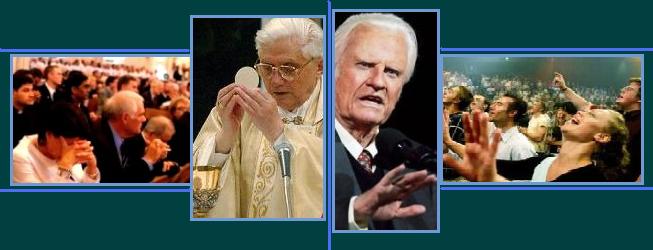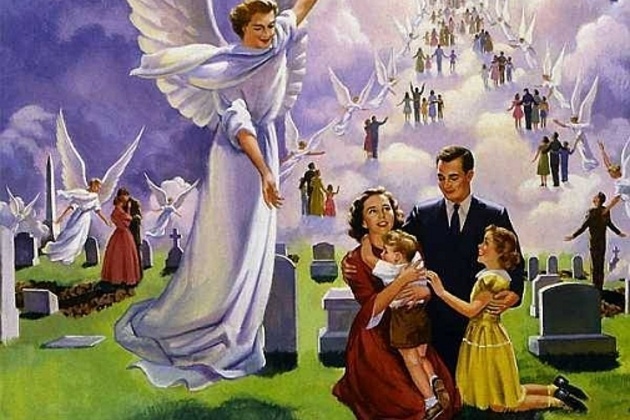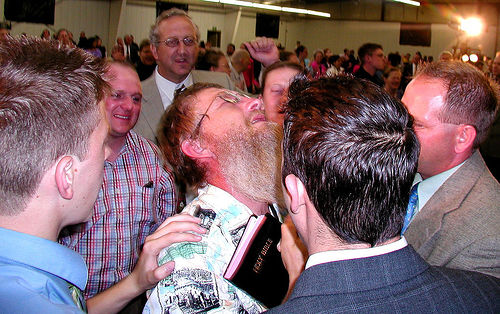One of the biggest challenges when attempting to explain Catholic doctrine is the language barrier. In other words, many of the terms that Catholics use to describe their beliefs seem down right strange and unbiblical to some. And although there any number of doctrines that Protestants accept that are not explicitly named in the Bible (i.e. the Trinity and the Incarnation), many would argue that these are at least easily inferred by reading the New Testament. Yet whether or not there is a double standard here, the perception is there regardless. Thus, what I am endeavoring to do in this particular post is to "walk back" some of the theological language in an attempt to give it a more Biblical sounding phraseology. I should mention however that Biblical language itself arises out of an encounter with Jesus Christ, and therefore should not be confused with some sort of divine glossary. Scripture is an encounter with Christ, not a catechism. Consequently, what I am seeking to do here is precisely what the early Church did long ago, which is to take the experience of the followers of Christ and give it a vocabulary that is deeply rooted in the totality of Biblical tradition. Incidentally, I should mention that for some of the examples provided below, there is more than one alternative.
1. The Immaculate Conception-----------> Mary's Immaculate Redemption (Example A)
----------------------------> The Predestination of Mary (Example B)
2. The Assumption of Mary------------------------> The Rapture of Mary
The term "rapture" does not appear anywhere in Scripture, but rather was a concept that was developed much later on (just to re-enforce an earlier point about how such terminology comes about). That said, in recent decades this idea has received renewed interest, especially on account of the popular "Left Behind" series. In Latin the word simply means to be "carried away", or "taken up", but in some Protestant circles it has practically become the lens through which the present age is to be interpreted. The premise of this end time theology goes something like this: if you wish to be "taken up into heaven" and thus avoid the coming "tribulations" (i.e. when everything hits the fan), you must believe in Jesus Christ coupled with this doctrine, lest you risk being "left behind". As it corresponds to the doctrine of Mary's Assumption, I am not precisely sure where the objection lies. What the dogma essentially states is that at the end of Mary's life she was taken up body and soul into heaven, or to put in more evangelical Christian terms, Mary was "raptured". In the Old Testament already we hear of this phenomena happening in the case of Enoch and Ezekiel. Does it make more sense that these Biblical figures would be assumed/raptured into heaven, but not the woman who was the only one in history to share the same DNA as God? Understandably, the objector will point out; "Well, Scripture describes this event in the case of Enoch and Elijah, but not in the case of Mary." But this is not entirely the case. In the book of Revelation, John (who lived with Mary until the end of her earthly life) sees a woman (bodily) in heaven that fits the description of the Virgin Mary (Revelation 12:1). This woman may be regarded in other ways, but it is undeniable that she first and foremost fits the description of the mother of Jesus Christ. Even the accompanying symbolism in this passage, and those prior, seem only to re-enforce our prior suspicion about this Lady (i.e. Mary is the New Ark of God). All this to say, what was being done in days of old is apparently being done in "days of new". For according to Scripture, the remarkable grace that was afforded Elijah, Enoch, and now Mary, will eventually be granted to all of the faithful- not by their own power of course- but by the power of our Lord who will eventually "assume" all of the faithful into heaven. So let us call it the Rapture of Mary if it pleases, but do not say that it is unfitting that the mother of our Lord should be the first after Christ (though apparently she wasn't) to be "caught up into the clouds to meet the Lord in the air." 1 Thessalonians 4:17
3. Priestly Celibacy --------------------------> Pauline Virginity (Example A)
One of the major misgivings that Protestants have concerning ministry in the Catholic Church is the fact that priests, with a few notable exceptions, are not permitted to marry. And while this is not a complaint merely consigned to Protestants (for many Catholics feel the same), it does seem to be a sticking point for some when it comes to being able to relate to the Church's ecclesial way of life. I have heard on any number of occasions my Protestant brothers and sisters complaining; "… but then how can they possibly relate to the needs of their congregation" or "without being married, how can they help counsel married couples?" I do not deny that these are valid concerns, and while I would like to address each of them, one by one, I must restrain myself and not go off on a tangent about doctors not needing to have cancer in order to treat patients with it, or jurists not needing to be guilty of crimes in order to judge them properly (in fact, I think the reverse is often preferable). And I certainly must avoid speaking at length about how not every priest or Protestant minister needs to be a professional counselor in order to give good counsel to married couples. No one's experience is precisely the same, so if that is the measuring stick of usefulness, then no one is useful. Are priests sometimes too detached from family life, yes. Are biological fathers sometimes too detached from family life? Do I really need to answer that? Anyhow, what we are discussing here most importantly is whether or not there is sufficient Biblical evidence to uphold this radical teaching of the Church. I suppose I could appreciate this complaint more if not for the fact that St. Paul, the one to whom Protestants look the most (other than Jesus Christ), were not himself a celibate. While of course never disparaging marriage, St. Paul did quite openly express his desire that the Corinthians might live in the same unmarried state as he (1 Corinthians 7:7). Imagine if a Protestant or Catholic pastor today said something like that to his congregation. "I understand that for some of you it is best to be in the married state, but oh how I wish that all of you would prepare yourself for the coming of the kingdom by living as if you were brother and sister..."
---------------------------------> Kingdom Celibacy (Example B)
But even if St. Paul had taken a wife, there would still be one passage from the Gospel of Matthew that would be utterly unavoidable in this regard; "For there are eunuchs who have been so from birth, and those who are made so by others, and there are those who choose to live like eunuchs for the sake of the kingdom of heaven. The one who can accept it should accept it" (Matthew 19:12). Apparently accepting a teaching such as this was not only difficult in our time, but in Jesus' as well. Notice the final example that Jesus provides. This "eunuch" is not merely one because of some unfortunate accident, but rather because he has chosen it freely as a means to give greater glory to God. Such a lifestyle choice would seem- in a most radical way- to mirror that of our Lord's, who himself was a "eunuch" for the kingdom. Where in Protestant theology is there room for such a laudable sacrifice? In the Old Testament there are various instances of individuals avoiding sexual activity as a sign of purity and devotion to God, but one specifically that stands above the rest. In the book of the prophet Jeremiah, God tells Jeremiah "not to take a wife". Historically, this drastic measure was related to the fall of Jerusalem, but meta-historically this prophetic sign points to a new order of things. As all prophets are in some way suggestive of the person of Jesus Christ, so also Jeremiah. And while Jeremiah is not the Savior, his behavior is meant to point to Jesus. Hence, the follower of Christ is not only called to deliver the same message as Christ, but to conform his life, inasmuch as he is called, to that very same lifestyle. And so how does Scripture describe that kingdom lifestyle? According to Jesus himself, it is a lifestyle which invites its inhabitants (at least in the above context), to "be like the angels in heaven... who are neither married nor given in marriage" (Mark 12:25). One may find this teaching "difficult" to countenance (as Jesus himself was quick to admit), but what we cannot say is that it is an invention of the Catholic Church.
4. Confession -----------------------------> The Sacrament of the Altar Call (Example A)
Ironically, the term "altar call" which, again, is not expressly in Scripture, is in some ways better suited to a Catholic milieu. After all, Catholics really do have altars, and they really do see those altars as places eminently suited for sacrifice. In any case, what unites the various versions of the "altar call", is the fact that, in whatever church they take place, they generally tend to involve three things; a) the admission of sins; b) a commitment (or re-commitment) to the vows of Baptism; and c) the desire for some semblance of peace and reconciliation with God. The fundamental difference between the Protestant version of "confession" and the Catholic one (at least outwardly), is that Protestants are actually quite old school about how they carry out the ritual. For instance, in the early Church if one needed a "come to Jesus" moment they too expressed it in front of the whole congregation. Thus, the individual today who goes up to the front of the congregation, confesses their worst, and then is mowed down by a touch of the hand and a dose of the Holy Spirit, is not all that different from those who did so in the early centuries. Yet in spite of every good intention, the Church recognized the danger and abuse that can occur when one so openly exposes their guilt (let us please avoid the Church of Oprah, thank you). Subsequently, the Church thought it eminently advisable to make such "re-commitment ceremonies" much quieter so as to bypass all of the potential for public theatrics. Indeed, making the "altar call" private was not only helpful in terms of avoiding blatant hypocrisy, but also in terms of inviting a more frequent opportunity for a personal "come to Jesus", irrespective of whether or not the preacher called for it on that particular night.
-----------------------------------> Baptismal Renewal (Example B)
5. The Communion of Saints ------------> The Fellowship of the Saved (Across Time)
6. Intercession ----------------------------> Angelic Intercession (Example A)
Another doctrine that tends to make Protestants a little queazy is the doctrine of intercession/intercessory prayer. Once again, Jesus Christ is the sole Mediator between God and man, so why complicate matters by throwing in other figures? The problem with this mentality, however understandable it may be, is that it rooted in a false understanding of authority. Yes God is the ultimate Authority over everything, but in his generosity he permits his creatures to share/participate in that very same authority (lower case) all while preserving his own. Why? Because God is not an autocrat, he is rather a Communion. A prime example of God "sharing" this intercessory power can be seen in the activity of the angels. In the Old Testament we encounter what are referred to as the armies of God (called hosts). No, these are certainly not those gluttonous little chubby cherubs that you see on Greeting cards. To the contrary, they are front line warrior who battle against powers and principalities. We are also fortunate enough to hear tell in the the Old Testament (and New) of the Archangels; Michael, Gabriel, and Raphael. These angels are sent on a variety of errands, which involve, but are not limited to, delivering apocalyptic messages from God Himself to God's people. Included in all that, are numerous other spirits, too mysterious and unusual to be adequately defined here. In the New Testament we continue to encounter a whole array of angels. For example, we are briefly introduced by Jesus to the creatures known in theological terms as "guardian angels". Their particular assignment is to guard specific human beings. Thus, each individual has their own personal body guard assigned to them by God. And while their primary duty is to safeguard those to whom they have been assigned, they do, from what I hear, take personal "requests".
----------------------------> Our Guardian Ancestors (Example B)
------------------------------> The Offering of the Elders (Example C)











